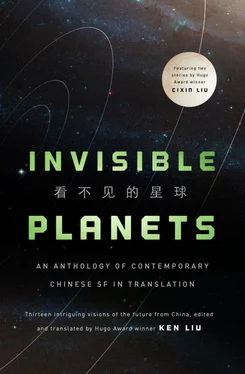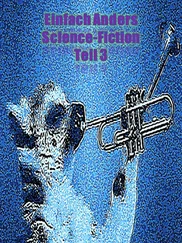The Secretary-General began to massage his back. The old wanderer shook his head, sighed, and said, “Sorry to be so much trouble to you.”
“Where are you from?” asked the President of the United States.
The old wanderer shook his head. “A civilization only has a fixed location in her infancy. Planets and stars are unstable and change. The civilization must then move. By the time she becomes a young woman, she has already moved multiple times. Then they will make this discovery: no planetary environment is as stable as a sealed spaceship. So they’ll make spaceships their home, and planets will just be places where they sojourn. Thus, any civilization that has reached adulthood will be a starfaring civilization, permanently wandering through the cosmos. The spaceship is her home. Where are we from? We come from the ships.” He pointed up with a finger caked in dirt.
“How many of you are there?”
“Two billion.”
“Who are you really?” The Secretary-General had cause to ask this. The old wanderers looked just like humans.
“We’ve told you many times.” The old wanderer impatiently waved his hand. “We are God.”
“Could you explain?”
“Our civilization—let’s just call her the God Civilization—had existed long before Earth was born. When the God Civilization entered her senescence, we seeded the newly formed Earth with the beginnings of life. Then the God Civilization skipped across time by traveling close to the speed of light. When life on Earth had evolved to the appropriate stage, we came back, introduced a new species based on our ancestral genes, eliminated its enemies, and carefully guided its evolution until Earth was home to a new civilized species just like us.”
“How do you expect us to believe you?”
“That’s easy.”
Thus began the half-year-long effort to verify these claims. Humans watched in astonishment as spaceships sent the original plans for life on Earth and images of the primitive Earth. Following the old wanderer’s direction, humans dug up incredible machines from deep below Earth’s crust, equipment that had through the long eons monitored and manipulated the biosphere on this planet.
Humans finally had to believe. At least with respect to life on Earth, the Gods really were God.
At the third emergency session of the United Nations General Assembly, the Secretary-General, on behalf of the human race, finally asked God the key question: why did they come to Earth?
“Before I answer this question, you must have a correct understanding of the concept of civilization.” God stroked his long beard. This was the same God who had been at the first emergency session half a year ago. “How do you think civilizations evolve over time?”
“Civilization on Earth is currently in a stage of rapid development. If we’re not hit by natural disasters beyond our ability to resist, I think we will continue our development indefinitely,” said the Secretary-General.
“Wrong. Think about it. Every person experiences childhood, youth, middle age, and old age, finally arriving at death. The stars are the same way. Indeed, everything in the universe goes through the same process. Even the universe itself will have to terminate one day. Why would civilization be an exception? No, a civilization will also grow old and die.”
“How exactly does that happen?”
“Different civilizations grow old and die in different ways, just like different people die of different diseases or just plain old age. For the God Civilization, the first sign of her senescence was the extreme lengthening of each individual member’s life span. By then, each individual in the God Civilization could expect a life as long as four thousand Earth years. By age two thousand, their thoughts had completely ossified, losing all creativity. Because individuals like these held the reins of power, new life had a hard time emerging and growing. That was when our civilization became old.”
“And then?”
“The second sign of the civilization’s senescence was the Age of the Machine Cradle.”
“What?”
“By then our machines no longer relied on their creators. They operated independently, maintained themselves, and developed on their own. The smart machines gave us everything we needed: not just material needs, but also psychological ones. We didn’t need to put any effort into survival. Taken care of by machines, we lived as though we were lying in comfortable cradles.
“Think about it; if the jungles of primitive Earth had been filled with inexhaustible supplies of fruits and tame creatures that desired to become food, how could apes evolve into humans? The Machine Cradle was just such a comfort-filled jungle. Gradually we forgot about our technology and science. Our civilization became lazy and empty, devoid of creativity and ambition, and that only sped up the aging process. What you see now is the God Civilization in her final dying gasps.”
“Then… can you now tell us the goal for the God Civilization in coming to Earth?”
“We have no home now.”
“But…” The Secretary-General pointed upward.
“The spaceships are old. It’s true that the artificial environment on the ships is more stable than any natural environment, including Earth’s. But the ships are so old, old beyond your imagination. Old components have broken down. Accumulated quantum effects over the eons have led to more and more software errors. The system’s self-repair and self-maintenance functions have encountered more and more insurmountable obstacles. The living environment on the ships is deteriorating. The amount of life necessities that can be distributed to individuals is decreasing by the day. We can just about survive. In the twenty thousand cities on the various ships, the air is filled with pollution and despair.”
“Are there no solutions? Perhaps new components for the ships? A software upgrade?”
God shook his head. “The God Civilization is in her final years. We are two billion dying men and women each more than three thousand years old. But before us, hundreds of generations had already lived in the comfort of the Machine Cradle. Long ago, we forgot all our technology. Now we have no way to repair these ships that have been operating for tens of millions of years on their own. Indeed, in terms of the ability to study and understand technology, we are even worse than you. We can’t even connect a circuit for a lightbulb or solve a quadratic equation…
“One day, the ships told us that they were close to complete breakdown. The propulsion systems could no longer push the ships near the speed of light. The God Civilization could only drift along at a speed not even one-tenth the speed of light, and the ecological support systems were nearing collapse. The machines could no longer keep two billion of us alive. We had to find another way out.”
“Did you ever think that this would happen?”
“Of course. Two thousand years ago, the ships already warned us. That was when we began the process of seeding life on Earth so that in our old age we would have support.”
“Two thousand years ago?”
“Yes. Of course I’m talking about time on the ships. From your frame of reference, that was three-point-five billion years ago, when Earth first cooled down.”
“We have a question: you say that you’ve lost your technology. But doesn’t seeding life require technology?”
“Oh. To start the process of evolving life on a planet is a minor operation. Just scatter some seeds, and life will multiply and evolve on its own. We had this kind of software even before the Age of the Machine Cradle. Just start the program, and the machines can finish everything. To create a planet full of life, capable of developing civilization, the most basic requirement is time, a few billion years of time.
Читать дальше












